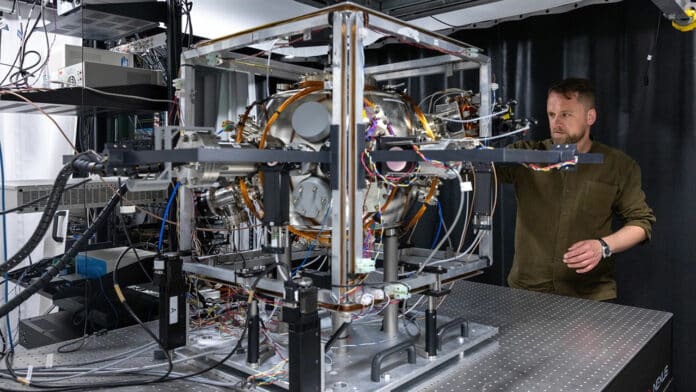Navigation systems are universal tools to help you find your way. Many navigation systems today rely on the Global Positioning System (GPS), which uses satellite signals orbiting the Earth. However, obstacles such as tall buildings can easily block satellite signals and are susceptible to jamming that prevents accurate navigation.
Self-contained satellite-free navigation systems exist; however, current technologies drift over time, meaning they lose accuracy only if regularly calibrated with satellites.
Researchers from The Imperial College London have developed a prototype of a quantum sensor that can enable GPS-free navigation, and they have tested a quantum sensor in collaboration with a Royal Navy ship.
Previously in 2018, researchers unveiled the ‘quantum compass’ prototype. Since then, they have been refining the technology to the point where it can be tested in the field.
The Imperial Quantum Sensor is a new type of accelerometer. Accelerometers measure how an object’s velocity changes over time. The current location can be calculated by combining this information with rotation measurements and the object’s initial position. Conventional accelerometers are used in various devices, such as mobile phones and laptops. However, with an external reference, these sensors can maintain their accuracy quickly.
The new quantum accelerometer uses ultracold atoms to make exact measurements. When cooled to shallow temperatures, atoms exhibit their quantum nature, resulting in wave-like properties. As the atoms move through the sensor, an optical ruler is created using a series of laser pulses to measure the atoms’ acceleration accurately.
Quantum sensors can eliminate drift in self-contained satellite-free navigation systems, significantly improving accuracy over long periods.
The latest Imperial quantum sensors were integrated into the Qinetiq NavyPOD, an interchangeable rapid prototyping platform, before sailing to London aboard the XV Patrick Blackett, a new Royal Navy research ship.
Professor Peter Haynes, Director of the Centre for Quantum Engineering, Science and Technology (QuEST) at Imperial, says: “The quantum accelerometer is a pioneering technology at the forefront of quantum innovation. It can transform navigation by making it more accurate and secure”.
The experiment is the first step towards understanding the application and exploitation of quantum-enabled navigation, which could provide significant navigational advantages when operating in satellite-denied areas.
